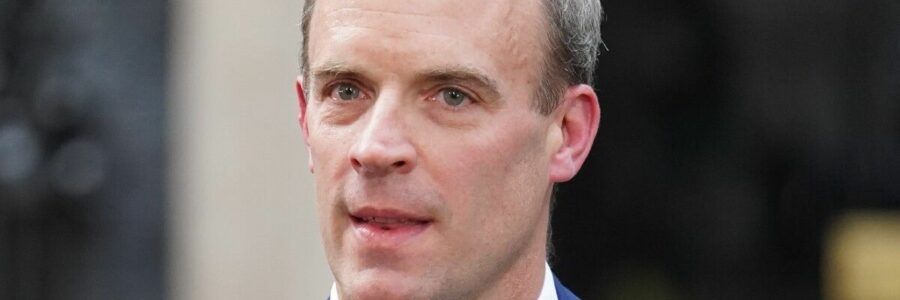
Key explosive allegations from Dominic Raab bullying report
Dominic Raab speaks after resigning from the cabinet
When Dominic Raab smiled across the House of Commons chamber at Labour deputy leader Angela Rayner just before the Easter recess when the two deputised at PMQs, few people would realise it was his final curtain call on the front bench.
Ms Rayner tackled the then Deputy Prime Minister over the bullying allegations swriling around him and his deadpan response was: “I’ve never called anyone scum.”
The answer was a reference to Ms Rayner’s infamous rant about Tories at the Labour Party conference. It was greeted with enormous cheers, but a series of events stretching over five years since he became Brexit Secretary have led to the undoing of Mr Raab’s career.
He resigned today from his dual roles of Deputy Prime Minister and Justice Secretary after an inquiry concluded he acted in an intimidating and aggressive way with officials in behaviour that could have amounted to bullying.
The probe by senior lawyer Adam Tolley KC looked at eight formal complaints when Mr Raab was Foreign Secretary, Brexit Secretary and during his first stint as Justice Secretary.
Here, the Express looks at some of the findings from the 47-page report which has been five months in the making:
Physical gestures
Staff had told the inquiry that Mr Raab banged on tables and put his hand towards someone’s face to stop them talking.
Mr Tolley said: “I heard a good deal of evidence about the DPM’s use of physical gestures in communication.
“At the most extreme, and which would have been unacceptable, this was put as extending his hand directly out towards another person’s face with a view to making them stop talking.
“Another example of such an allegation was loud banging of the table to make a point.
“At the opposite end of the spectrum, which would be regarded as acceptable, suggestions were made of the use of a defensive gesture to suggest that a person should hold off from speaking further, accompanied by a verbal explanation, or the use of a finger extended downwards to make a particular point.”
The senior lawyer found there was “scope for misunderstanding” and that Mr Raab had not intended to be threatening.

Shouting and swearing
Mr Raab was cleared of shouting and swearing at staff.
Mr Tolley wrote in the report: “There was no persuasive evidence that the DPM shouted at individuals. I also conclude that he did not swear at any individual or swear more generally.”
‘Woeful’ and ‘useless’ insults
Mr Raab is alleged to have described work as “utterly useless” and “woeful” during his first stint as Justice Secretary. He denied the claims today.
Mr Tolley said: “On balance, I think that these were the words used; they comprised criticism that was not in the nature of constructive feedback. They were reasonably understood as insulting personal criticism.”
‘Intimidating’ meetings
While at the Ministry of Justice, Mr Raab was said to have complained about a lack of “the basics” or “basic information”.
Mr Tolley said such comments were “likely to be experienced as an unfairly personal criticism”.
The report also found Mr Raab “acted in a way which was intimidating, in the sense of unreasonably and persistently aggressive” during a work meeting while Foreign Secretary.
It said: “His conduct also involved an abuse or misuse of power in a way that undermines or humiliates.”
Working style
Mr Raab’s style of working as a minister was “inquisitorial, direct, impatient and fastidious”, the report said.
Mr Tolley wrote: “He works assiduously and typically from about 7.30am until about 10pm, Monday to Thursday.
“The DPM’s style is, in his own words, inquisitorial, direct, impatient and fastidious.
“The DPM told me, and I accept, that he tends to prepare extensively for meetings, will typically have read all of the key papers and identified questions in advance.”
Coming out fighting
Mr Raab has come out swinging with an extraordinary resignation letter and a furious newspaper column.
The Esher and Walton MP said the inquiry has “set a dangerous precedent” by setting a “low” threshold for bullying, which he says will “encourage spurious complaints”.
And in an article for the Telegraph, he criticised the “Kafkaesque saga” and claimed the nation will “pay the price” if the threshold for bullying in government has been lowered.
Source: Read Full Article